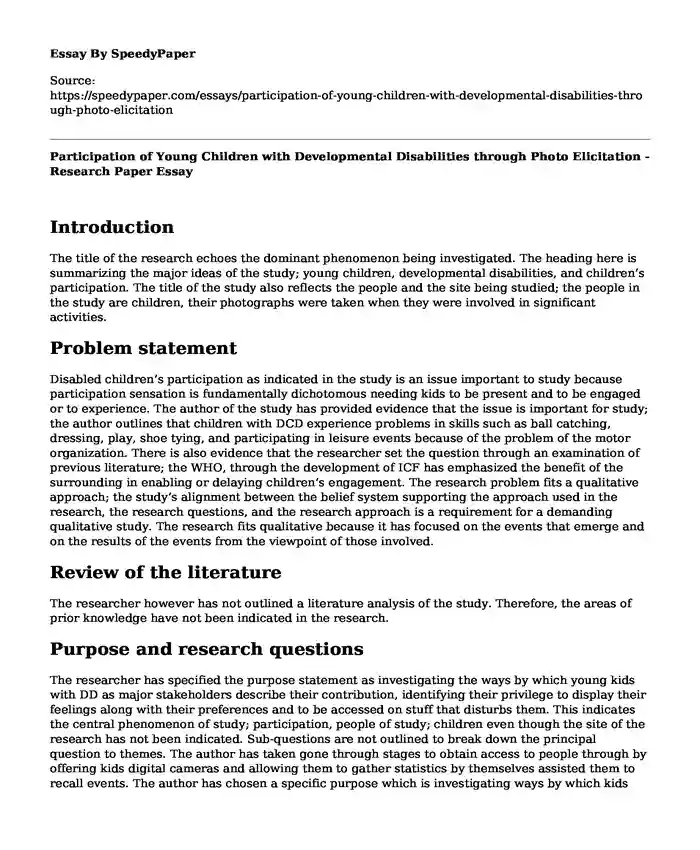
| Type of paper: | Research paper |
| Categories: | Healthcare Disorder Psychological disorder |
| Pages: | 3 |
| Wordcount: | 785 words |
Introduction
The title of the research echoes the dominant phenomenon being investigated. The heading here is summarizing the major ideas of the study; young children, developmental disabilities, and children’s participation. The title of the study also reflects the people and the site being studied; the people in the study are children, their photographs were taken when they were involved in significant activities.
Problem statement
Disabled children’s participation as indicated in the study is an issue important to study because participation sensation is fundamentally dichotomous needing kids to be present and to be engaged or to experience. The author of the study has provided evidence that the issue is important for study; the author outlines that children with DCD experience problems in skills such as ball catching, dressing, play, shoe tying, and participating in leisure events because of the problem of the motor organization. There is also evidence that the researcher set the question through an examination of previous literature; the WHO, through the development of ICF has emphasized the benefit of the surrounding in enabling or delaying children’s engagement. The research problem fits a qualitative approach; the study’s alignment between the belief system supporting the approach used in the research, the research questions, and the research approach is a requirement for a demanding qualitative study. The research fits qualitative because it has focused on the events that emerge and on the results of the events from the viewpoint of those involved.
Review of the literature
The researcher however has not outlined a literature analysis of the study. Therefore, the areas of prior knowledge have not been indicated in the research.
Purpose and research questions
The researcher has specified the purpose statement as investigating the ways by which young kids with DD as major stakeholders describe their contribution, identifying their privilege to display their feelings along with their preferences and to be accessed on stuff that disturbs them. This indicates the central phenomenon of study; participation, people of study; children even though the site of the research has not been indicated. Sub-questions are not outlined to break down the principal question to themes. The author has taken gone through stages to obtain access to people through by offering kids digital cameras and allowing them to gather statistics by themselves assisted them to recall events. The author has chosen a specific purpose which is investigating ways by which kids with DD describe their input and how they express their feelings and preferences since very little is known on their perception of participation.
Data Collection
The data collection method is specified; a Photo Elicitation approach. The data collection method is not extensive because of several factors such as short attention span of the children, lack of spontaneous conversation, use of different vocabulary, and stranger anxiety that prevented the use of a variety of data collection methods. The author has used a protocol in data collection by providing children with digital cameras and they were requested to take pictures or videos of activities they engaged in at home, school, or in the community during the week. There are a conceptual framework and an in-depth discussion of data collection strategies.
Data analysis and findings
After the analysis of data in the study, the researcher came up with four central themes and crucial figures from kids helped indicate every theme and to represent the complete series of children’s perceptions. The themes were; 1st theme; playing, 2nd theme; Learning, 3rd theme: peers and family meetings, 4th theme; obstacles and facilitators of participation. Sufficient evidence was obtained to support each theme and sub-theme; through a series of questions that the researcher asked the children. Multiple sub-themes have been derived by the researcher from the main theme for example main theme 1: Playing -sub-theme; friendship, features of activity materials, Main theme 2: Learning-sub theme; appreciation, affirmation, and appraisal and environmental factors affecting learning, Main theme 3: Family-Socializing with friends and families leading to gathering feeling of belonging and happiness and conducting household responsibilities and simple care practices as being a part of a family. The findings were accurate and realistic as a total of 32 parents from the middle-class economy staying in the Flemish, Belgium was enumerated to take part in the research.24 of them were contacted for additional information.
Writing
The account has been written persuasively and convincingly, with every step of writing research, followed and described. The research presented is qualitative as the data is subjective, interpretative, descriptive, holistic, and bountiful. The themes and sub-themes have been represented as sections and subsections. The research has used dialogue for example the dialogue between the researcher and the children. The author has used MLA style in writing references.
Cite this page
Participation of Young Children with Developmental Disabilities through Photo Elicitation - Research Paper. (2024, Jan 03). Retrieved from https://speedypaper.com/essays/participation-of-young-children-with-developmental-disabilities-through-photo-elicitation
Request Removal
If you are the original author of this essay and no longer wish to have it published on the SpeedyPaper website, please click below to request its removal:
- Free Essay on Nutrition in Preventive Medicine
- Essay Example: General Principles of Healthcare Budgeting
- The History of Bipolar Disorder, Essay Sample
- Nutrition Essay Example on Paleo Diet
- Free Essay: Aging Populations and Theory
- Exploring Addiction Models: Integrating Care for Comprehensive Recovery - Free Essay Example
- Drug Addiction - Essay Example
Popular categories




